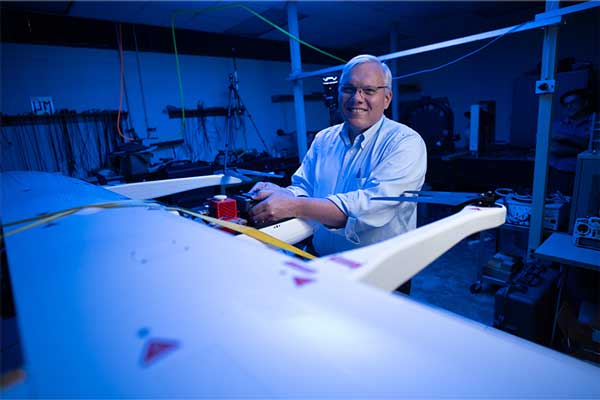mediaroom
Drone Research Earns CAESER Scientist $3.4 Million Grant

July 1, 2024 — A senior researcher with the Center for Applied Earth Science and Engineering Research (CAESER) at the University of Memphis recently received a $3.4 million grant from the U.S. Army Research Office to continue developing a network of drones with different sensors affixed to each to enhance imaging and reporting capabilities.
A professor of electrical and computer engineering in the Herff College of Engineering, Dr. Eddie Jacobs also serves as the director of the Drones, Robotics, and Navigation Enabled Systems Research Cluster in the FedEx Institute of Technology at the UofM.
Jacobs has 20-plus years in the fields of novel imaging sensor technologies and unmanned aerial systems (UAS), colloquially known as drones. According to Jacobs, in this latest research each drone-based sensor provides a different view of an area so that when the drones are combined, they give a clearer picture of what might be happening. The lab’s drone technology has applications for the military but also in agriculture and environmental assessment, he said.
“This grant provides opportunities for the University of Memphis to grow its research infrastructure while contributing to the advancement of drone-based sensor networks,” Jacobs said. “It is also allowing me to provide terrific research opportunities to both graduate and undergraduate students.”
Jacobs’ lab first began working on drones in 2016. One of the lab’s first projects involved building a drone that could take water samples, which encountered mixed results.
“We spent around $8K building that drone and it was very difficult to fly; flights were short and it crashed more often than I would have preferred,” Jacobs recounted. Since then, autopilots and other sensors have improved to the point where flights are routine and crashes are rare. His lab now uses a mix of custom made and commercial UAS platforms that are very reliable, which allows scientists to concentrate on the sensing and networking aspects of their research.
The UofM research team includes Jacobs, who is co-principal investigator, along with co-principal investigators Aaron Robinson, PhD, and Chrysanthe Preza, PhD. Their research involves the development of hyperspectral sensor technology and algorithms for anomaly detection. Jacobs is also working with Lan Wang, PhD, to develop a new communication network system for UAS using Named Data Networking (NDN).
In 2021, researchers at the University of Arizona and the University of Central Florida joined Jacobs’ team.
“Our colleague at the University of Arizona is Dr. Ron Driggers, who also happens to be the first doctoral graduate from the Herff College of Engineering. His team developed an innovative approach for wide-area coverage using multiple inexpensive cameras,” said Jacobs. “Our colleague at the University of Central Florida, Dr. Kyle Renshaw, is developing magnetic sensors for use on UAS along with an innovative optical wireless communication system.”
In this new effort, they will also be joined by Travis Fields, PhD, from the University of Missouri – Kansas City. Fields will help design UAS systems that can be optimized for their missions such as long and steady flight for wide area coverage, or more dynamic missions involving getting close to objects and areas of interest.
Founded in 1951, the U.S. Army Research Office funds research proposals from educational institutions, nonprofit organizations and private industry to increase fundamental knowledge and understanding across key scientific disciplines related to long-term national security needs, taking a long-term view of the projects and their potential applications.
This project was secured with the assistance of the Memphis Institute for National Defense and Security (MINDS). MINDS enables the pursuit and management of federal defense contracts procured through the National Defense Authorization Act. The Institute provides service and support for any member faculty submitting to defense agencies and helps to ensure that reporting, contracting, and other key deliverables are managed efficiently and effectively. Members are also provided support in the pursuit of Federal NDAA inclusions and other key defense partnerships. For more information on MINDS and the University of Memphis defense research strategy please email research@memphis.edu.
####
MEDIA CONTACT:
Jennifer Godwin
Director of Media and Public Relations
jennifer.godwin@memphis.edu
(O) 901.678.4822 (M) 501.529.7482
